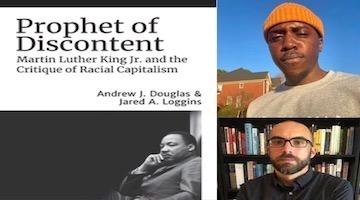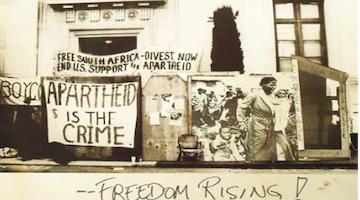BAR Book Forum: LeRhonda S. Manigault-Bryant’s“Talking to the Dead”
Being connected to one’s ancestors is not hocus pocus, but a way to navigate life and struggle.
“What might our lives look like if we took seriously the ways that our ancestors laid important groundwork for inhabiting the world?”
In this series, we ask acclaimed authors to answer five questions about their book. This week’s featured author is LeRhonda S. Manigault-Bryant. Manigault-Bryant is Associate Professor of Africana Studies at Williams College. Her book is Talking to the Dead: Religion, Music, and Live Memory among Gullah-Geechee Women.
Roberto Sirvent: How can your book help BAR readers understand the current political and social climate?
LeRhonda S. Manigault-Bryant: Thanks so much to the readers of BAR for taking the time to engage in my work, and for giving me the opportunity to share my ideas with you. In Talking to the Dead, I describe Black women’s longstanding and common—though underexplored—practice of communicating with ancestors throughout the South Carolina lowcountry. I encourage readers to see talking to the dead as a spiritual practice that can be seamlessly integrated into one’s life, and that need not conflict with the practice of formal religious traditions such as Protestant Christianity. Ultimately, Talking to the Dead encourages readers to acknowledge and accept that there are other kinds of knowledge that informs our lives, including and especially ancestral knowledge.
Given the tumult that characterizes our current political and social climate, it is imperative for black folks to tap into the ways of knowing that have always been a part of our lives and experiences—grandmother wits, ancestral knowledge, things that have been passed down and on to us by those we love who are no longer present, etc. And by ancestral knowledge I am not just referring to random tidbits of information, which can be helpful, but do not have the sustained impact that deep forms of knowing can. I am talking about the kinds of knowledge that have timeless relevance. For me, for example, it has been a longstanding lesson on the importance of humility, which my grandmother instilled in me while showing me how to cook. The cooking was meaningful, yes, but her warning against the dangers of pride has been even more powerful and lasting. I think that greater reliance on these alternative ways of knowing can be an important sounding board as we make sense of and decipher things in our current political moment, and especially those things that cause us to question everything that we know (or thought we knew!).
What do you hope activists and community organizers will take away from reading your book?
Before you raised this question, I had not really focused on how folks who are doing the work on the ground could benefit from this book. The more I think about it, however, the more I realize that Talking to the Dead could really prove fruitful for activists and community organizers, particularly for the ways it reminds us all to stay connected to the ancestral forces that have impacted and continue to inform our lives. This, I think, is an especially important thing for activists and organizers to remember, and especially so when their work leads to activist fatigue or activist burnout. It is in those most tired, vexing and despairing moments that one can literally rely on and tap into ancestral energies as an important reminder of what is at stake. Organizers and activists are truly standing on the ancestral shoulders of people who have laid down their lives to make room for the work that they are doing. So, I hope that activists and community organizers alike will remember to invoke their ancestral ties, and to use those ties to give them sustaining energy. I also hope they might use Talking to the Dead to help remind them of what was important historically, and what continues to be important.
We know readers will learn a lot from your book, but what do you hope readers will un-learn? In other words, is there a particular ideology you’re hoping to dismantle?
I absolutely love this question because it gets right at the heart of my hopes for Talking to the Dead. The first thing I hope readers un-learn is the idea that being connected to one’s ancestors in an open, intentional way is hocus pocus, the same thing as being haunted, or some outlandishly negative practice connected to Black religion as popularized in the media. I strive to dismantle these negative, but widespread, discourses about African American religious expression.Talking to the Dead is really an example of a group of Black women’s subversive ingenuity as it relates to their experiences of faith, and it demonstrates how these women find communicating with deceased ancestors to be an affirming way of navigating their lives.
I also hope readers will un-learn our reliance upon western notions of reason and objectivity. The irony of this second claim is that I raise it in a particularly heightened moment of “alternative facts” where there are so many iterations of what is right or true or real that it can be really difficult to discern what we should believe and why. And yet, those of us who are aware of how knowledge is produced know that the western move toward objectivity is also a construct. Black folks have always had to contend with being on the short end of that reason stick, so to speak, and tapping into ways of knowing that have always helped us mitigate western notions of truth are as important and reliable, and especially when taken into account with everything else we know. There is more than one way to understand something or come to a sense of truth, and talking to the dead, then, can be another tool for discerning.
Who are the intellectual heroes that inspire your work?
I have so many well known intellectual (s)heroes who inspire me. Among the better known are Octavia Butler, Zora Neale Hurston, and the late Katie Cannon. I am also continuously drawn to the work and writings of the Black theologian and mystic Howard Thurman. Their writings inspire me because of their powerful abilities to tell stories that capture the vivid realities of human experience. Then there are the lesser known that are even more important to me. My husband James is a magnificent deliberate writer and whom I characterize as my always-there inspiration. Most of all, I am inspired by my late maternal grandmother Annie Mae, whose presence and purposefulness in life has left an indelible mark in me. She taught me so many things, and even as she was not an academic or writer or any such thing, she has been the person who has singlehandedly influenced me the most. In the end, I think it is totally fitting that I take my inspiration from the living and the dead.
In what way does your book help us imagine new worlds?
Talking to the Dead is a metaphysical project because it tries to articulate the ineffable. In this way, it is a constructive reimagining from beginning to end. What might our lives look like if we took seriously the ways that our ancestors laid important groundwork for inhabiting the world? How might we live if we acquiesced to an inner voice that is just as informed by the things that we have learned in the present as much as the things we know from our pasts? How could we find creative yet productive ways to rely on the ancestral wisdom alongside book knowledge and ensuring that those knowledge forms were passed on? These questions are not merely speculative for me. Rather, in Talking to the Dead I reveal what some of those possibilities are through the example of black women, who are also striving to imagine their worlds anew. I hope that their stories can illustrate all manner of possibility for us all.
Roberto Sirvent is Professor of Political and Social Ethics at Hope International University in Fullerton, CA. He also serves as the Outreach and Mentoring Coordinator for thePolitical Theology Network. He is co-author, with fellow BAR contributor Danny Haiphong, of the new book, American Exceptionalism and American Innocence: A People’s History of Fake News—From the Revolutionary War to the War on Terror.
COMMENTS?
Please join the conversation on Black Agenda Report's Facebook page at http://facebook.com/blackagendareport
Or, you can comment by emailing us at comments@blackagendareport.com



















